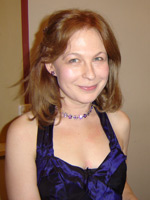My father decided when I was a small child that I should be a concert pianist. It was not my own choice. My parents saved up for a piano. Buying one
before anybody had any idea whether I was musical at all was a big risk.
My mother was my first piano teacher, though
she is very modest about her own abilities. My father did not play, but
somehow he acquired very fine musical judgement. My parents were always
a great source of help and support to me.
At primary school there was a peripatetic teacher,
but only of brass, so I learned the trumpet. At [Chethams] music school
I also played the harpsichord. Although not an organist, I was
privileged to be able to give a recital last year on Handel’s organ at
St Lawrence’s, Stanmore.
Because I started training to be a musician when I was a child, it’s really difficult for me to imagine doing anything else.
I wish I had more time to practise and reflect. When I perform, much of it happens intuitively. I hope I succeed in conveying that spontaneity.
The lot of musicians is hard in Britain, but it
would be absurd for me to complain when I see people suffering as a
result of war, famine, and natural disasters. I am just grateful I have
the chance to make my living from music.
I much prefer playing in churches and cathedrals to, say, theatres.
The natural light that is part of the design is so uplifting. Last
month, it was particularly special to play at the moorland church of
Lastingham, North Yorkshire.
I have always loved Bach above all other
composers. No other music is so perfect an integration of emotional
expression and intellectual rigour. After him, for me, come Mozart, who
can smile on the surface and be sad underneath, and Beethoven, who so
humanly expresses the struggle of life.
Although I always play a lot of Bach, I have recently enjoyed playing Romantic composers — last month I had the chance to perform some Chopin pieces on Chopin’s own piano.
Great pianists of the past played with an imagination and a strength of character not so common today. I particularly admire Gould and Gilels. Also, I was lucky enough to hear Richter and Cherkassky live.
In one sense, my best friends are long-deceased composers.
I was brought up to have very strong family values, so family is vitally important to me.
What would I like to be remembered for? It can only possibly be for my music.
Although his theology is quite dense, and may be just
for specialists, I identify with what Pope Benedict writes about the
importance of music in giving us a symbolic, spiritual understanding of what cannot be conveyed in words.
In the Bible, I love the story of Noah's Ark. I am most moved by St Matthew’s words of the Passion story, in Bach’s setting; when I listen to that music I am closest to having
the certainty of faith. I find the story of Abraham and Isaac very
disturbing.
When I need to relax, my cats, Rhapsody, Saffron, and little Solomon are always there to help. I am happiest when I am with them.
I love the beauty of nature: I find it very consoling, so I am happy both by the sea and among mountains. I come from Yorkshire and it has both.
The whole of Vienna is like a pilgrimage place for me, because it is associated with so many composers, but I always make an effort to go to St Stephen’s Cathedral.
I pray for the alleviation of suffering,
especially if people I care about are ill or infirm. I am very troubled
by how much suffering there is in the world, and by what Christians
call the problem of evil.
I would most like to get locked in a church with my father, whom I miss very much.
Back to Jill Crossland News Page
Jill Crossland (www.jillcrossland.com)
is shortly to perform four cathedral concerts: Wakefield, on 3 June (at
lunchtime); Bradford, 6 June; Newport, 26 June; and Brecon, 27 June
(all 7.30 p.m.). She was talking to Terence Handley MacMath.
|

